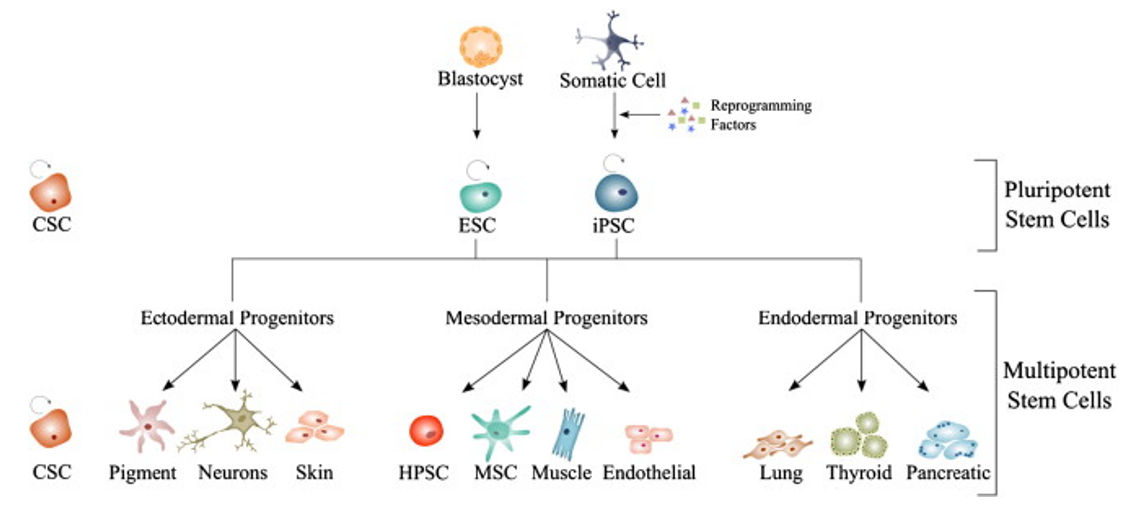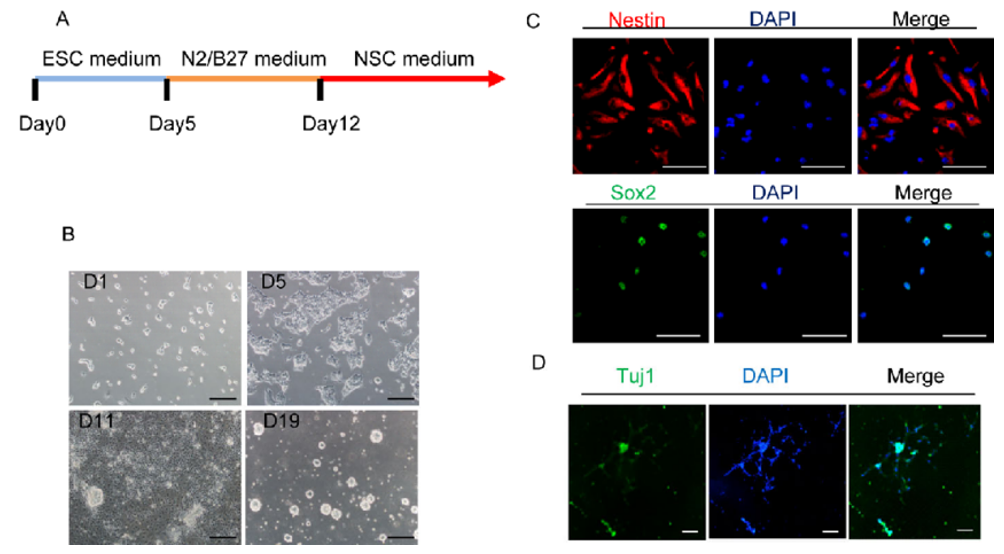- You are here: Home
- Services
- Stem Cell Research
- iPSC Differentiation
Services
-
Cell Services
- Cell Line Authentication
- Cell Surface Marker Validation Service
-
Cell Line Testing and Assays
- Toxicology Assay
- Drug-Resistant Cell Models
- Cell Viability Assays
- Cell Proliferation Assays
- Cell Migration Assays
- Soft Agar Colony Formation Assay Service
- SRB Assay
- Cell Apoptosis Assays
- Cell Cycle Assays
- Cell Angiogenesis Assays
- DNA/RNA Extraction
- Custom Cell & Tissue Lysate Service
- Cellular Phosphorylation Assays
- Stability Testing
- Sterility Testing
- Endotoxin Detection and Removal
- Phagocytosis Assays
- Cell-Based Screening and Profiling Services
- 3D-Based Services
- Custom Cell Services
- Cell-based LNP Evaluation
-
Stem Cell Research
- iPSC Generation
- iPSC Characterization
-
iPSC Differentiation
- Neural Stem Cells Differentiation Service from iPSC
- Astrocyte Differentiation Service from iPSC
- Retinal Pigment Epithelium (RPE) Differentiation Service from iPSC
- Cardiomyocyte Differentiation Service from iPSC
- T Cell, NK Cell Differentiation Service from iPSC
- Hepatocyte Differentiation Service from iPSC
- Beta Cell Differentiation Service from iPSC
- Brain Organoid Differentiation Service from iPSC
- Cardiac Organoid Differentiation Service from iPSC
- Kidney Organoid Differentiation Service from iPSC
- GABAnergic Neuron Differentiation Service from iPSC
- Undifferentiated iPSC Detection
- iPSC Gene Editing
- iPSC Expanding Service
- MSC Services
- Stem Cell Assay Development and Screening
- Cell Immortalization
-
ISH/FISH Services
- In Situ Hybridization (ISH) & RNAscope Service
- Fluorescent In Situ Hybridization
- FISH Probe Design, Synthesis and Testing Service
-
FISH Applications
- Multicolor FISH (M-FISH) Analysis
- Chromosome Analysis of ES and iPS Cells
- RNA FISH in Plant Service
- Mouse Model and PDX Analysis (FISH)
- Cell Transplantation Analysis (FISH)
- In Situ Detection of CAR-T Cells & Oncolytic Viruses
- CAR-T/CAR-NK Target Assessment Service (ISH)
- ImmunoFISH Analysis (FISH+IHC)
- Splice Variant Analysis (FISH)
- Telomere Length Analysis (Q-FISH)
- Telomere Length Analysis (qPCR assay)
- FISH Analysis of Microorganisms
- Neoplasms FISH Analysis
- CARD-FISH for Environmental Microorganisms (FISH)
- FISH Quality Control Services
- QuantiGene Plex Assay
- Circulating Tumor Cell (CTC) FISH
- mtRNA Analysis (FISH)
- In Situ Detection of Chemokines/Cytokines
- In Situ Detection of Virus
- Transgene Mapping (FISH)
- Transgene Mapping (Locus Amplification & Sequencing)
- Stable Cell Line Genetic Stability Testing
- Genetic Stability Testing (Locus Amplification & Sequencing + ddPCR)
- Clonality Analysis Service (FISH)
- Karyotyping (G-banded) Service
- Animal Chromosome Analysis (G-banded) Service
- AAV Biodistribution Analysis (RNA ISH)
- Molecular Karyotyping (aCGH)
- Droplet Digital PCR (ddPCR) Service
- Digital ISH Image Quantification and Statistical Analysis
- SCE (Sister Chromatid Exchange) Analysis
- Biosample Services
- Histology Services
- Exosome Research Services
- In Vitro DMPK Services
-
In Vivo DMPK Services
- Pharmacokinetic and Toxicokinetic
- PK/PD Biomarker Analysis
- Bioavailability and Bioequivalence
- Bioanalytical Package
- Metabolite Profiling and Identification
- In Vivo Toxicity Study
- Mass Balance, Excretion and Expired Air Collection
- Administration Routes and Biofluid Sampling
- Quantitative Tissue Distribution
- Target Tissue Exposure
- In Vivo Blood-Brain-Barrier Assay
- Drug Toxicity Services
iPSC Differentiation
Differentiation is the process where an unspecialized cell acquires cellular traits that allow it to perform specialized functions. Indeed, the actual potential of iPSCs rest in their direct differentiation to various types of somatic cells. In order to use iPSCs to treat disease or as research tools to study diseases, fully functioning specialized cells are required for testing potential drugs or transplanting healthy cells in clinical stages. Creative Bioarray has developed protocols for iPSC differentiation to various lineage-committed cell types thereby expanding the scope of your research, drug discovery, or screening projects.

Creative Bioarray Offers iPSC Differentiation Service for Your Scientific Research as Follows (including but not limited to):
- Neuronal cells from iPSCs
The process of iPSC differentiation to neurons and neuronal cells is of special importance for neurobiology and related disorders, considering the dearth of clinically relevant in vitro models available for research, drug screening and development. Creative Bioarray now focuses on directing hiPSCs into four major specific neuronal sublineages which are serotonergic, cholinergic/motor, dopaminergic, and serotonergic neurons.
Neural cells, such as: Neural stem cells (NSCs), Neural Progenitor cells (NPCs), Mature Astrocytes, Dopaminergic neurons, Motor neurons progenitor, Cerebral cortical neurons, Oligodendrocytes, DOPA Neuron, Microglia.
Human iPSC-derived retinal pigment epithelium (RPE) provides a physiologically functional cell model to study ocular diseases. Creative Bioarray provides high quality RPE with typical cobblestone morphology and pigmentation, and high purity RPE expressing RPE-specific markers BEST1/rpe65.
Creative Bioarray offers ready-to-use and functional cardiomyocytes that are desirable in vitro models for high content toxicity and drug screening, and cell regeneration research. We provide iPSC-derived cardiomyocytes from healthy or diseased patients.
Creative Bioarray generates iPSC-derived immune cells including CD34+ progenitor cells, CD8+T cells, NK cells, monocytes, and dendritic cells from clonal master iPSC line(s) using highly optimized and efficient differentiation protocols for preclinical applications.
iPSC-derived hepatocytes as developing liver disease models, are feasible and physiologically relevant alternative for discovering therapeutic treatments, drug targets, and understanding drug induced liver inquiries (DILI). Creative Bioarray's hepatocyte differentiation services include: expansion of iPSCs, progenitor cells differentiation and characterization, terminal differentiation, and characterization of differentiated cells by ICC (per markers).
Example for neural stem cell (NSC) differentiation from iPSCs:
 Fig. 1 Generation and characterization of neural stem cells derived from iPSCs.
Fig. 1 Generation and characterization of neural stem cells derived from iPSCs.
Creative Bioarray is an experienced and outstanding provider of iPSC differentiation service. We are dedicated to providing quality data and comprehensive service for your scientific research, and we are pleased to use our extensive experience and advanced platform to offer the best service to satisfy each demand from our customers.
If you have any special need in iPSC differentiation service, do not hesitate to contact us for this special service. Please let us know what you need and we will accommodate you. We are looking forward to working with you in the future.
Explore Other Options
For research use only. Not for any other purpose.

